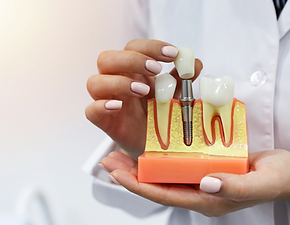
OUR SERVICES
We offer a full suite of dental services designed to keep your smile healthy and beautiful for life! Explore what we can do for you and your family below.
Our Services

Dental Exams & Cleanings
Ensure your oral health is in top shape with our thorough dental exams and cleanings, designed to prevent dental issues before they start. We use state-of-the-art equipment to clean plaque and tartar buildup, leaving your mouth fresh and your teeth sparkling.
Root Canals
Relieve pain and save your natural tooth with our root canal treatment to remove infected tissue, preserving the tooth's structure and restoring its function and comfort.
-21.jpg)
Gum Disease Treatment
Combat gum disease with our advanced laser treatment, offering a minimally invasive alternative to traditional surgery. This cutting-edge technique reduces discomfort and promotes faster healing, effectively targeting and eliminating gum infections.
Extractions
When a tooth cannot be saved, trust our Fort Worth dental team to perform safe and efficient tooth extractions, ensuring your comfort throughout the process and discussing replacement options to maintain your smile's integrity.
-12.jpg)
Fillings
Restore the health and appearance of your teeth with our durable, tooth-colored fillings to repair cavities, preventing further decay while seamlessly blending the fillings with your natural tooth color.
Night Guards
Protect your teeth from the effects of grinding and clenching with our custom-fitted night guards. Designed to fit comfortably, our night guards prevent wear and tear on your teeth, ensuring a peaceful night’s sleep and long-term dental health.



COSMETIC DENTISTRY

Veneers
Transform your smile with our custom-made veneers, designed to cover imperfections such as chips, gaps, or stains. Our cosmetic dentist in Fort Worth expertly crafts these thin porcelain shells to fit seamlessly over your existing teeth, creating a flawless, natural-looking smile.
-39.jpg)
Composite Bonding
Quickly improve the appearance of your teeth with composite bonding, a versatile treatment ideal for fixing discoloration, chips, and small gaps. Skillfully applied and shaped composite material blends perfectly with your teeth, enhancing your smile.
-11.jpg)
Clear Aligners
Achieve a straighter smile discreetly with clear aligners, a modern alternative to traditional braces. These nearly invisible aligners to comfortably fit your teeth, gradually shifting them into the desired position without the need for metal wires or brackets.
Teeth Whitening
Brighten your smile with our professional teeth whitening services, offering noticeable results. Professional Whitening strength products can safely lift stains and discoloration, giving you a whiter, more radiant smile with lasting effects.
Gingivectomy
Improve the health and appearance of your gums with a gingivectomy, a precise procedure used to remove excess gum tissue. Dr. Kirk utilizes state-of-the-art laser technology for this treatment, enhancing the symmetry of your gum line with minimal discomfort and recovery time.
Neurotoxin Therapy
Neurotoxin treatments can address TMJ disorders and alleviate discomfort from teeth clenching and grinding. This versatile treatment, administered with the same attention to detail and care as all our dental services, can help enhance your overall and comfort.



RESTORATIVE DENTISTRY

Crowns & Bridges
Repair and protect damaged teeth or replace missing ones with our custom-made dental crowns and bridges to restore the shape, strength, and appearance of your teeth, ensuring a seamless fit and a beautiful, functional smile.

Dentures
Dentures offer a traditional and effective way to replace missing teeth, enhancing your smile and improving your ability to eat and speak. We provides both full and partial dentures, custom-designed to fit comfortably and look natural, giving you back your confidence and quality of life.
PRF Therapy
Accelerate healing and enhance the success of dental procedures with PRF (Platelet-Rich Fibrin) therapy. This innovative treatment uses your own blood's healing properties to promote faster recovery, reduce inflammation, and improve the outcomes of procedures such as extractions, implants, and bone grafting.

Dental Implants
Restore your smile and confidence with dental implants, a durable and natural-looking solution for missing teeth Titanium posts are placed into the jawbone, providing a strong foundation for replacement teeth that look, feel, and function like your natural teeth.

-22.jpg)
Bone Grafting
Prepare for dental implants or other restorative procedures with bone grafting, a technique used to enhance the volume and density of your jawbone creating a solid foundation for future dental work and improving overall oral health.

